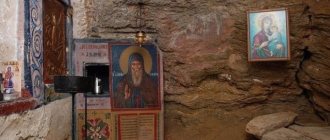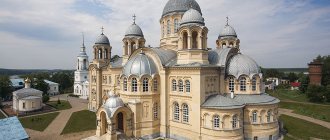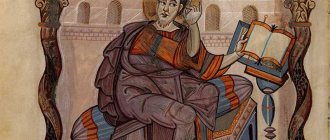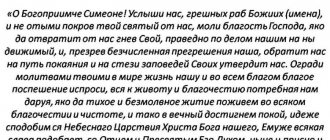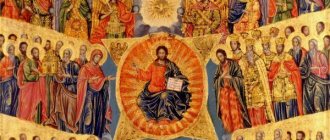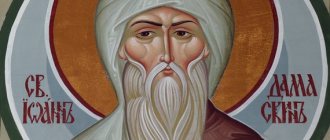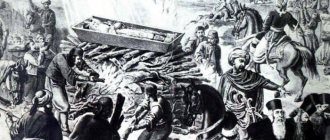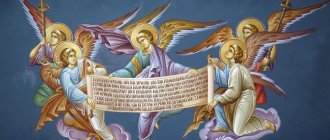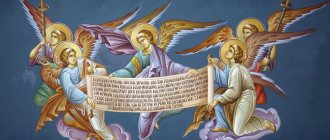| St. Simeon the Myrrh-Streaming. Fresco from the 13th century, Studenica Monastery |
Simeon the Myrrh-Streaming, Hilandar
(1113/1114 - 1200), great zhupan [1] Serbian (Rash), ktitor, monk, reverend Commemorated February 13 on the day of his death, November 3 (Greek) in remembrance of the reunion with St. Savva in the Vatopedi monastery in 1196, in the Councils of Athos and Hilendar venerables
In the world, Stefan Nemanja, was born in 1113 or 1114 in the region of Zeta (present-day Montenegro), the youngest of four sons of Župan David [2], ruler of Raska. At that time Zeta was under Latin jurisdiction, but when his parents left Zeta, they baptized him in the Orthodox Church and raised him in love for the true faith and holy virtues [3].
His father entrusted him with the management of one of the regions early on. After the death of his father, thanks to his talent as a ruler, people's love and the help of the Byzantines, he became the great župan of Raska in 1166 or a little later, around 1170.
During his reign, he had to face the hostility of his brothers and be imprisoned for the sake of Orthodoxy. But thanks to his unshakable faith and the intercession of the Great Martyr George, he defeated his enemies and over time managed to unite most of the Serbian lands. After Stephen overcame his rebellious brothers around 1170, they were forced to submit to him and the order he had established, at which time he added the phrase "by the grace of God" to his title. In 1190, after a series of clashes with Byzantium (in 1172, 1183 and others), he obtained from it official recognition of the independence of the Serbian state. As a result of numerous wars with the Byzantines, the lands between Timok and Morava, many Bulgarian lands, Upper Macedonia and part of Northern Albania came under his hand; Serbian dominance was established in Zeta, in Holm and Travuniya, in Bosnia. By the end of Stephen's reign, only the northern part of his own Serbia remained outside his power, being under the rule of the Hungarian crown. Regarding relations with more distant lands, it is known that Stephen sought rapprochement with the Roman-German Emperor Frederick Barbarossa when he was heading to Palestine through Serbia and Bulgaria in 1189.
| Prpp. Anastasia and Simeon the Myrrh-Streaming, parents of St. Savva Serbsky. Fresco, Gracanica Monastery. |
God consoled the great zhupan by giving Princess Anna, the daughter of the Byzantine emperor, as his wife.
Having themselves acquired holiness, the couple gave birth to three sons, two of whom also became saints: Vukan, Stephen, later the venerable first-crowned king, and Rastko-Rostislav, later the great Saint Sava of Serbia. Thus, Stephen became the founder of the Nemanjić dynasty, which ruled for two centuries and gave the Church many saints. Trying to transform Serbia into an Orthodox kingdom, the holy ruler supported the Church and fought against heresy. Around 1186, he convened a Council to rid the country of the Bogomil heresy. He also cared about the destruction of paganism and the displacement of Latinism from his possessions. With the help of his pious wife, he erected and maintained many temples both in his own land and abroad, making rich donations to the major spiritual centers of the Christian world. Among the monasteries he built was the Serbian Lavra - the Studenitsky Monastery, built around 1183.
Having strengthened the Serbian state and properly organized the life of the Church in his land, the great Župan decided to devote himself entirely to serving God. The crowning achievement of his life was his abdication of the throne in 1196, when, at the age of 82, he followed the advice of his son, Saint Sava, and entered the monastic path at the Studenitsa monastery with the name Simeon. His wife also became a monk with the name Anastasia, and power in the country passed to his eldest son, Stephen. Soon Simeon went to his son on Holy Mount Athos, where, in the guise of a simple monk, he entered the Vatopedi Monastery. The father became a humble disciple of his son, imitating, as far as age allowed, the zeal with which Savva devoted himself to prayer. In 1198, Vatopedi gave father and son, the Serbian crowned monks Sava and Simeon, the Hilandar Lavra, which was then in ruins. Father and son worked hard to restore the monastery, practically rebuilding it from scratch.
They labored in Hilandar for only eight months when Simeon fell ill. Before his death, he called his son Savva, said goodbye to him cordially, asked him to dress himself in funeral clothes and lay him on the floor in ashes, placing a stone under his head. Then he called all the monks, asked them for forgiveness and, looking at the icon of the Mother of God, went to the Lord with the words: “Let every breath praise the Lord” (Ps. 150: 6). This happened on February 13, 1200, when the saint was 86 years old [4].
| St. Simeon the Myrrh-Streaming. Fresco from 1568, Church of the Virgin Mary of the Studenica Monastery |
Relics and veneration
The Monk Simeon was initially buried in the Hilandar monastery he recreated. After his repose, the relics of the saint remained soft and warm and exuded a gentle myrrh, from which many miracles occurred.
In 1204, Saint Sava decided to return to Serbia and took his father’s body with him. The entire Serbian people witnessed that Simeon's body was still warm and looked alive, as if sleeping. The arrival of his father's relics helped to pacify the enmity of his sons Stefan and Vukan. The relics of the holy ruler-monk were reburied in the Studenitsky Monastery and continued to stream myrrh. When Prince Stefan, for political reasons, decided to abandon Orthodoxy in 1216, the flow of myrrh stopped. Then, in front of the grave, Sava’s letter to his father was read out - and the saint again showed favor and patronage towards his people. The relics of Saint Simeon remain in Studenica to this day, bringing healing and consolation to those who come.
The brethren of Hilandar initially mourned the loss of the relics, but the monk appeared in a dream to Abbot Methodius and said that the relics had to be returned to Serbia, but in return a grapevine would grow from his grave. Soon after, in 1207, a vine began to grow from the stone wall of the cathedral church, on which grapes have been growing ever since. The stem of the vine comes out of the wall at a height of one and a half meters from the ground, from the empty tomb of St. Simeon. Monastic tradition says: as long as the vine bears fruit, the holy blessing of St. Simeon will rest on Hilendar. The vine bears fruit to this day and has a wonderful gift: its grapes are dried and distributed all over the world to help childless families.
The Life of Saints Simeon and Savva was compiled by Simeon's eldest son, the Venerable Stephen the First-Crown (ed. R. J. Safarik in Pámátky dřevniho piseimnetvi Jihoslovanův
, Prague, 1851) and the Hilandar hieromonk Domentian, a disciple of St. Sava (ed.
Belly of St. Simeon and St. Save
, Belgrade, 1865). On the icons it is written as a gray-haired, long-bearded old man in monastic vestments; sometimes, as a sign of Great Zhupan dignity, a crown is also depicted on his head.
| St. Simeon the Myrrh-Streaming. Revered icon of the Yakhroma Trinity Cathedral |
Prayers
Troparion, tone 3
Having been enlightened by divine grace, / and after death you show the lightness of your life, / you exude the fragrance of myrrh / flowing to the race of your relics, / and you have guided your people to the light of God’s understanding, / Simeon our Father, / pray to Christ God / to grant us great mercy.
General Troparion of St. Simeon the Myrrh-streamer and his son, St. Sava Serbskago, voice 1
The monasteries of Hilandar, the holy builders, / and the lamps of Athos, / I praise Serbia, / the great Simeon, the blessed ones, / and his wonderful family, the saint, - the verb, - Savva, / the priest child, we honor the verb: / pray to Christ God for your flock, blessedness , // and about the Church being freer from circumstances.
General Troparion of St. Simeon the Myrrh-streamer and his son, St. Sava Serbskago, voice 1
Who have been warm intercessors in sorrows and misfortunes, / Simeon the God-Bearing and the High Hierarch Savva, / let us fall to him with faith, / as through their prayers we deliver from misfortunes, / according to our duty, we faithfully glorify the Savior and God, saying: / glory to Him who gave you strength, / Glory to Him who glorified miracles, / Glory to Him who delivered us from sorrows through your prayers.
Kontakion, tone 6
Having loved the life of angels on earth, / worldliness and the world abandoned, / you followed Christ, Simeon, with fasting, / you apostolically instructed those who love you without courage, crying: / love God as He loved us.
In Kontakion, voice 2
The yoke of Christ was received, Simeon, / and the Cross followed Him, / planted in the house of the Lord, prosperous, like a date, / like a cedar, like in Lebanon, you multiplied your children, / a man of spiritual desires, a miracle worker who appeared, / Pray to Christ God unceasingly for all of us.
Kontakion general st. Simeon the Myrrh-streamer and his son, St. Savva Serbskago
Having loved the life above, glorious, / despised the life that exists on earth. / For this reason, in the highest, the Angels are always rejoicing, / pray for us all.
In kontakion general st. Simeon the Myrrh-streamer and his son, St. Savva Serbskago
Today Simeon and Savva, blessed, have come in the spirit, / saving their flock from the circumstances: / these who preached the Trinity of the One God, / the affirmation appeared to the Church, / the Myrrh-streamer in the saints and the miracle worker in the saints: / these, even in the battles of the insurmountable defenders, appeared, / Praise of Mount Athos and the Serbian people's fortress.
Prayers to Saint Simeon the Myrrh-Streaming for Infertility
St. Stephen, in monasticism Simeon, King of Serbia, Myrrh-Streaming (1200).
Born in 1114 from Zhupan David, Stefan (Simeon in monasticism) was the youngest of four sons. Even at an early age, he ruled so wisely and piously that after the death of his father, most of the country was given to him to rule; and then he suffered all his life from the wrath of his brothers. God consoled him by giving him Princess Anna, the daughter of the Byzantine Emperor, as his wife. And they, having themselves acquired holiness, gave birth to two sons, who also became saints. Trying to transform Serbia into an Orthodox Kingdom, the Monk Simeon erected and maintained many churches in Serbia itself and throughout the Christian world. The crowning achievement of his life was his abdication of the Throne, when he followed his son, Saint Sava, at the age of 82. Together they labored on the Holy Mountain, founding the Serbian Hilandar Monastery here. With his face illuminated by heavenly light, the Monk Simeon fell asleep in God at the age of 86. His relics remained soft and warm and exuded gentle myrrh. When Saint Sava returned to Serbia, he brought with him the relics of his father, and all the people witnessed that Simeon’s body was still warm and looked alive, as if he was sleeping. Currently, his relics reside in the Studenitsky Monastery, which he erected and in which he began his monastic life. And to this day, by God’s grace, they bring healing and consolation to all who come. The Monk Simeon was the ruler of Serbia, but he renounced the earthly kingdom and devoted his entire life to winning for himself the incorruptible Kingdom in heaven. He established many monasteries in his country and, on the banks of the Studenica River, built a magnificent temple in the name of the Most Pure Mother of God, ordering it to be lined inside from base to ceiling with marble and decorated with gold. Always supplying the poor with everything they needed, Saint Simeon finally distributed all his incalculable wealth to the poor: After this, having voluntarily transferred to the management of his son Stephen all the lands that were under his rule, he immediately left the world and followed his son, the Monk Savva,2 Before this, he accepted monasticism in one of the monasteries of Mount Athos. Arriving at the holy mountain, the monk, with the assistance of his son, restored here a deserted monastery with a church, called Hilandar, and began to asceticize in it. Having learned the fear of God and unswervingly fulfilling the rules of monastic life regarding prayer and fasting, Saint Simeon achieved dispassion, humbled his sinful mind and, with the assistance of the grace of God, became a great ascetic. In abstinence and fasting, he reached such a height that he became like the Angels.
Therefore, even during his lifetime, many monks flocked to his monastery from different countries to glorify God, and for many of them he was a mentor and leader on the path to salvation. Having lived his life there piously, the Monk Simeon, in deep old age, with joy and bright hope of eternal bliss, went to the Lord, whom he loved so much during his life.
Upon the repose of the saint, the Lord honored him with the gift of miracles for his great virtues. His body began to exude myrrh, and through him, by the power of God, many miracles began to be performed. After this, the saint’s son, the Monk Sava, carried his father’s body to Serbia and honorably laid it in the church in the name of the Most Holy Theotokos, on the Studenica River, which Saint Simeon himself built with such love at his own expense. And to this day, pious Christians from the shrine, where the relics of St. Simeon rest, take myrrh, anoint themselves with it for various illnesses and receive healing.
THE VINE OF SAINT SIMEON THE MYRRHSTREAMING (help for childless couples)
I am a mother! My daughter is only a few months old, but her birth has changed the life of my family, our relatives and friends. And it’s not about those pleasant changes in everyday life and the daily schedule that a new, small family member naturally changes. It's about a miracle that changed us all...
When I was 24 years old, my husband and I had the opportunity to be parents, but due to my youth, stupidity and ambitious nature, I crossed out this opportunity. I mean abortion. Yes, abortion, the murder of an unborn baby. This terrible act will be my endless pain for the rest of my life. Now I know that at eight weeks the fetus’s heart is already beating, its fingers are formed, and the Lord gives the unborn little man an immortal soul, a meeting with which I now cannot avoid...
Now I have become a believer. And then there was a completely different life, in the foreground in which there was a career. For her sake, our child was sacrificed. We both had a successful career, our material well-being increased many times over, but for whose sake? What were these acquisitions and sacrifices for? In the evenings, in a large apartment, it was just the two of us, and there was complete silence around us... The things for which I took mortal sin on my soul: career, material well-being, comfort, life for myself - everything depreciated and became meaningless. It was bitter and scary to realize this...
It was then that my husband and I remembered God. We got married. This important event occurred after six years of marriage, at the very beginning of our path to the Church. I began to hope that now that we have repented of what we have done, the Lord will perhaps forgive us and send us a child.
But years passed and nothing changed. Only faith in God was strengthened, the understanding that everyone was given their own cross in life, which must be borne without complaint. We always remembered that the Lord gave us a chance, but we rejected it. So we had no one to blame for our childlessness but ourselves. My husband and I constantly went to confession and received communion, which for us was the main type of “treatment” for infertility. In addition, we spent five years seeing doctors, titled and not so, both of them passed an innumerable number of all kinds of tests, underwent more than one course of treatment - the funds allowed, but nothing helped. The treatment was terribly exhausting, I could not think about anything except this problem. As a result, I found myself in a vicious circle of depression, which poisoned my life even more. Doctors made a diagnosis: a severe inflammatory process, as a result of which pregnancy, if possible, would only be ectopic. It was a sentence that we had to live with. Our parents spared us and tried not to ask questions. But their silent anxiety made us suffer doubly. Only my close friend, also a believer, but, unfortunately, without a family, was unshakably confident that everything would be fine with us, that the Lord was simply testing and educating us. I thought that the solution for our family would be to adopt one or two orphans, but my husband honestly admitted that he would not be able to raise other people’s children, that he would not be able to truly love them. After another useless course of treatment, I decided that it was the last.
My husband and I were thirty-three years old, and we had come to terms with the idea that we would never have children. All the more surprising and long-awaited was what happened to us after this medical verdict! One fine day, the priest told us that a monk he knew had come from the holy Mount Athos and brought an amazing ancient shrine: a piece of a grape twig and three dried grapes.
This vine grows in the Hilendar Monastery. Its trunk emerges from the wall of the cathedral church at a height of one and a half meters from the ground, from the empty tomb of St. Simeon the Myrrh-Streaming (Stefan Nemanja). The monastic legend says: “When 7 years had passed since the death of Saint Simeon (February 13, 1200), Saint Sava (son of Saint Simeon) came to the monastery in order to take his relics to his homeland in Serbia, for the reconciliation of the warring princes . Hilendar's monks wept inconsolably.
Then Saint Simeon appeared in a dream to Abbot Methodius and said that his relics needed to be transferred to his homeland, but as a consolation to the Hilendar brethren, a vine would grow from his empty tomb, and as long as it bore fruit, his blessing would rest on Hilendar... “Since then, for eight centuries until the present day, the vine bears fruit abundantly every year. This vine is also amazing and wonderful in that its fruits resolve the infertility of spouses. From ancient times to this day, the brethren of the monastery have been preparing, and then distributing and mailing such “envelopes of hope” to infertile spouses around the world. In response, the monks ask for only one thing - to report on the healings that have occurred and, if possible, send photographs of newborn babies to the monastery. The monks pray for the health of each new child of Saint Simeon...
Father gave this holy vine to my husband and me. In the envelope, in addition to the shrines themselves, there was also a letter with recommendations from the monastery on how spouses should accept the donated shrine.
As stated in the letter, we ordered a prayer service to St. Simeon in the church for the gift of children, and dipped a piece of vine into the blessed water. Forty days, during which the spouses should take this water on an empty stomach, they had to spend in fasting and have a separate bed, and also make fifty bows daily with prayer to the Savior and the Mother of God. We timed this period to coincide with the Nativity Fast, and on November 28, 2001 we began to receive the shrine. Every day we turned to St. Simeon, begging him to grant a miracle. I did not doubt the power of the saint’s prayer, for the Lord more than once gave us the opportunity to verify the power of the intercession and intercession of the saints for us sinners, but I was afraid that it was not God’s will for our family to have children. My husband, on the contrary, was surprised at my fears and believed so simply and firmly that his spiritual attitude was transmitted to me. He and I decided that if we had a child, we would order a large painted icon of St. Simeon into our church and insert a piece of the very vine that resolved our infertility.
The Nativity fast is over, and the forty-day period of eating the shrine is over. And on February 17 (I will always remember this day) the test showed that I was pregnant. To be honest, even then I doubted it, thought that the test was wrong, and did two more. But they all showed positive results! Then everything was like a dream. We immediately served thanksgiving prayers to the Savior, the Mother of God and Saint Simeon the Myrrh-Streaming. Since the doctors spoke about the possibility of only an ectopic pregnancy, we immediately did an ultrasound, which showed that everything was completely fine.
We immediately reported what had happened to our priest. We cannot express how grateful we were for such a wonderful gift! In the depths of my soul, I immediately decided that only he would be the godfather of our baby. We didn’t immediately tell our parents the good news, but only three months later. And they told us in detail why we are expecting a child. We wanted the people around us to also be able to touch the amazing miracle. How wonderful it is that even in our age of materialism, rationalism and lack of faith, such a holiday of Faith is celebrated!
My pregnancy was easy. I almost didn’t feel tired, although I had to work a lot and hard in the first trimester. Father blessed me to receive communion every Sunday, and after going on maternity leave, at every Divine Liturgy when I could be in church. Knowing how doctors sometimes irritate pregnant women with bad tests, too much or too little weight gain and other “horror stories,” I kept visits to medical institutions to a minimum. Once a month I visited the antenatal clinic and took the required tests every other time. “Well-wishers” often frightened me with my age (33 years old), working on a computer, and advised me to see an expensive doctor at one of the well-known medical centers. But I didn’t pay attention to these tips and I don’t regret it at all.
The only thing my husband and I decided for ourselves at the beginning of pregnancy was to choose a good maternity hospital and give birth together. And again they tried to dissuade me, saying that a husband shouldn’t watch his wife’s birth process, that this is the “wrong side of life,” and lying with a child is very difficult, I won’t get enough sleep, and by the time I’m discharged I won’t have the strength. Fortunately, I didn’t listen to this advice either. We chose a maternity hospital in the city of Dolgoprudny, small and very cozy. Then everything was very simple. I was admitted without waiting for the start of labor, because the planned date had already passed. In addition, I have poor vision (about minus 7), and I was repeatedly offered (in other maternity hospitals) to have a caesarean section. But after a couple of days, labor began. I immediately called my husband, and within half an hour he was already at the hospital. Previously, we took courses in preparation for childbirth, so my husband actively helped me breathe correctly, gave me a pain-relieving massage, gave me something to drink, wiped my face with cool water, called a doctor when necessary, and most importantly, made it clear every minute that he was nearby and everything is going well.
We must pay tribute to the high professionalism and human support of doctors, obstetricians and all the medical staff of the maternity hospital. The birth went quickly, without a single hemorrhage in the eyes and without any complications at all. My newly born daughter, still wet, was placed on my stomach. This is such a huge and difficult to describe happiness! Never before in my life have I experienced such unearthly happiness.
Another shock awaited us when we opened the church calendar and began to choose a name for our daughter. She was born on November 12, on this day the only female names were Anastasia and Elena. After reading more closely, we saw that this is the day of remembrance of Helen, Queen of Serbia. This seemed to us like providence, since Saint Simeon, who begged our daughter, was the first-crowned king of Serbia. Imagine our joy and surprise when, already at home, we read that Queen Helena was the daughter of Saint Simeon (King Stefan Nemanja). That's how the whole royal family took us under their protection.
Now there are three of us in the family. We grow and rejoice in every new day, never ceasing to thank God for admonition and the miracle given to us. And if my example and my mistakes help change the decision of at least one woman and avoid this terrible, mortal sin - killing her child, my life will not be lived in vain.
Dear women! If you decide to have an abortion because of financial problems, for the sake of a career or something similar, remember that the Lord will still take away what the murder was committed for. God forbid anyone to have prosperity at such a terrible price! I know this from myself... We have fulfilled our vow to the end, and now in our church there is an icon of St. Simeon the Myrrh-Streaming with a piece of healing vine. And all infertile spouses who dream of children, but do not have the opportunity to visit Holy Mount Athos (only men are allowed there), can come to the Trinity Cathedral in the city of Yakhroma and pray before the holy image of Simeon the Myrrh-Streaming. And through your prayer and faith it will be given to you...
contacts:
Holy Mount Athos code 03770 Hilandar monastery tel. 23797 its konak or representative office in Kareya (which is on Athos) tel. 23203 Information about telephones on Athos 23209 Panteleimonovsky monastery tel. 23252 konak 23201 In Moscow, the courtyard of the Panteleimonov convent tel. 095 2980558 Society “Russian Athos” 095 2913586
You can write to the monastery of St. Simeon the Myrrh-Streaming in Greece. You can write in Russian. You will be sent a twig of vine and grapes with instructions on how to use them, and an icon.
The only thing you need to do is pay for the parcel (within a dollar) upon receipt at the post office. And they also ask you to let us know when your baby is born and, if you want, to send a photo.
Monastery address:
Monastere Hilandar: 63086 Karyes: Mount Athos Greece
Troparion of St. Stephen, in monasticism of Simeon, King of Serbia, Myrrh-Streaming
voice 3 You have been enlightened by Divine grace, / and after death you show the lightness of your life, / you exude the fragrance of myrrh / flowing to the race of your relics, / and you have guided your people to the light of God’s understanding, / Simeon our Father, / pray to Christ God / to grant us great things mercy.
Kontakion of St. Stephen, in monasticism Simeon, King of Serbia, Myrrh-Streaming
Voice 6 Having loved the life of the angels on earth,/ you have left peace and peace,/ you have followed Christ, Simeon, with fasting,/ you have apostolically instructed those who love you without courage, crying:/ love God as He loved us.
Miraculous Vine of St. Simeon the Myrrh-Streaming
About the miraculous vine of St. Simeon the Myrrh-Streaming in the Hilandar Monastery on Holy Mount Athos is told by the monastery’s resident, Fr. Dositheus. On the southern side of the Hilendar Cathedral Church of the Presentation of the Blessed Virgin Mary, every pilgrim is struck by a highly grown and highly branched vine, bent down and forming a kind of gazebo from its branches. Its stem comes out of the wall at a height of one and a half meters from the ground, from the tomb of St. Simeon (Stefan Nemanja), which is located next to the same wall, on the inside of the temple. The Hilendar legend about this 800-year-old vine reads: “When seven years had passed since the death of Saint Simeon (February 13, 1200) and when Saint Sava came from the Kareya cell to the monastery in order to prepare the transfer of the relics of Saint Simeon to Serbia, so that To promote the reconciliation of their warring brothers, the monks of Hilendar cried inconsolably. Then Saint Simeon appeared in a dream to Abbot Methodius and said that his relics needed to be transferred to his homeland, but as a consolation to the Hilendar brothers, a vine would grow from his empty tomb; and as long as it bears fruit, his blessing will rest on Hilendar.”
This miraculous vine has a special property - its fruits resolve the infertility of spouses through faith and prayer of those who take this miraculous remedy.
Those who, by God's blessing, would like to have offspring, let them turn their prayers to St. To Simeon the Myrrh-Streaming, who, having left his Serbian kingdom, labored on Holy Mount Athos, founded the Hilandar monastery and died there after many godly works, having been rewarded by the Lord with the gift of miracles - may he resolve the infertility of spouses who resort to him in faith. For this purpose, you need to take a bunch and part of a branch from the vine, which miraculously grew from the very tomb of St. Simeon. Three berries and one piece of stem are placed in one bag. This piece should be placed in a vessel filled with blessed water (650 grams), and both spouses should drink from the vessel before each meal for 40 days. Then the husband must taste one berry, and his wife - two. During these 40 days, spouses must follow the following rule: Eat only fast food and make fifty bows daily: 25 in the morning with the prayer Lord Jesus Christ, Son of God, have mercy on us, and 25 in the evening with the prayer: Reverend Father Simeon, pray to God for us. Anyone who wants can double the number of bows, that is, add another 50 with the prayer: Most Holy Theotokos, save us. All this time it is necessary to abstain from marital intimacy. After 40 days, the husband and wife must confess and partake of the Holy Mysteries of Christ, and then the Lord, by faith, will bless the spouses with conception.
After conception, throughout the entire period of pregnancy and breastfeeding, spouses must abstain from marital intimacy and live in purity. From the life of the prophet Samuel it is clear that his mother Anna breastfed her son for three years, all this time without sharing his bed with her husband, and then gave birth to more children. Although everyone thought that she was barren, where God wants, natural laws are defeated. After all, the birth of a child is a gift of God, and not human will. The Lord said: I am the seven who creates man and breathes spirit into man. The Apostle commanded parents to remain in fasting and prayer, subordinating marital desires to higher goals, so that those who have wives would be as if they had not (1 Cor. 7:29).
Therefore, let us repeat to the spouses once again: do not be slaves of the body, but work for the spirit, for all Christians are called by God to live not in uncleanness, but in light.
Look at the animals that to this day follow with absolute precision the natural law given to them by God at the creation of the world and which says that after the conception of the fetus, intercourse is not allowed, neither during pregnancy nor during feeding. And man, as you yourself see, becomes worse than cattle, indulging in passionate desires and forgetting about his dignity given to him by God, who created him in His image and likeness. By violating God's law, a person acts against nature and brings the righteous wrath of God upon his offspring. The consequences of this anger are the following: infidelity of a spouse, discord and other troubles, incurable diseases from which children suffer, premature death of a husband, wife, as well as their beloved children. This is how the Lord punishes spouses who do not submit to God and His laws, who have lost the fear of God and who have followed the path of carnal wisdom, which is the enemy of God. They kill themselves, their children and their offspring up to the third and fourth generation, depriving themselves of the Kingdom of Heaven forever.
Spouses must, even before resolving their infertility, strictly follow the church rules established for them, namely: abstain from intimacy on the eve of Sundays and holidays, on the eve of Wednesday and Friday, during all four fasts prescribed by the church, but especially during the Great Pentecost, i.e. Great Lent. The remaining time can be used in decency and fear of God for married life. But the Lord gave the man a wife as help in their common life, blessing them with the words: Be fruitful and multiply, and not for the sake of lustful sensuality, which knows neither time nor measure in its unrestraint.
Therefore, we pray to you, Orthodox Christians, our spiritual children in Jesus Christ and beloved brothers in baptism: guard your holy marriage in all purity and truth of God, follow all the commandments of God, and then the Heavenly Physician of soul and body will heal your infertility and overshadow your family with His By grace. And for the fulfillment of your request, give alms to the poor and needy. After all, you will not receive the gift of giving birth to a child by yourself, and, in addition, you will achieve the Kingdom of Heaven, which is promised to those who love God, and you will be together with those who have pleased God through works of mercy, in which may Jesus Christ help us, through the intercession of the Most Pure One. and His Most Blessed Mother, the Virgin Mary, through the prayers of Saint Simeon the Myrrh-Streaming Wonderworker and all the saints of Athos, for whose sake may we be given a blessed end to this temporary life and eternal life, where we will ceaselessly glorify the Most Holy, Life-Giving and Indivisible Trinity, the Father, and the Son, and the Holy Spirit , to whom be glory forever and ever, Amen.
Blessing of the Serbian Royal Lavra, HILANDARA monastery, Holy Mount Athos

